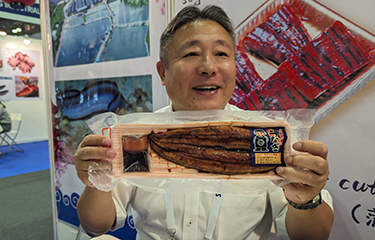Fujian Qingliu Shoho Eel banking on flavor in market expansion efforts

Fujian Qingliu Shoho Eel Industry, a subsidiary of C-J Global Group, is aiming to expand the market for its eel products beyond Japan.
The company farms eel in Qingshui County, in the Fujian Province of China, and has a headquarters in Tokyo, Japan. It sources its baby eels from Japan and from the U.S. state of Maine, raising them to market size at its farm.
Fujian Qingliu Shoho Eel Industry General Manager of Asia Wei Zhang told SeafoodSource during Seafood Expo Asia – which ran from 11 to 13 September in Singapore – has managed to secure a sizable portion of the Japanese market.
The company farms its eel in areas low in pollution at the upper reaches of the river, ensuring there are no nearby residential areas or rice fields to avoid water contamination from sewer systems, fertilizers, or pesticides. The company also uses a proprietary feed mix to ensure a consistent product.
Once its eels have been harvested, the eels are cleaned over a 24 to 48 hour process, filleted, and further processed.
The company currently markets its eel products, Zhang said, in Japan, Southeast Asia, and the U.S., but the main portion of the market is Japan. For that reason, the company is working to expand its markets beyond just Japan.
“We want to expand our U.S. market, step by step,” he said.
Part of what the company is using, Zhang said, is Fujian Qingliu Shoho Eel’s authentic flavors.
“We want to bring our products to the U.S. market to let them know the real taste of the Japanese eel, and kabayaki, the famous Japanese food,” he said.
Kabayaki is a method of grilling in Japan, most popularly used in eel. The fish is split down the back, deboned, and cooked on a grill or griddle. Fujian Qingliu Shoho Eel sells a value-added, pre-cooked version of the product in a number of different sizes.
The company can also match the size of its eels to the needs of its customers – whether that be a retailer or a restaurant.
“We can ask the factory to customize it to the customer,” Zhang said.
“There are so many competitors that bring their eel to the U.S. market, but we think they didn’t realize the real taste of the eel, so we, as a company headquartered in Japan, know the real flavor,” Zhang said. “So we want to bring the authentic taste.”
Photo by Chris Chase/SeafoodSource






Share